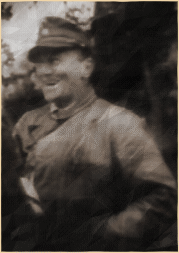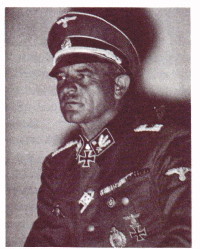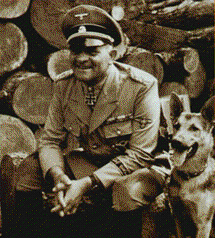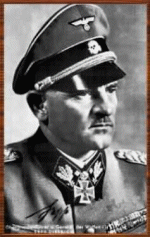

 Josef "Sepp" Dietrich was born on May 28, 1892, in Hawangen. As an apprentice
in the hotel industry he visited Austria, Italy, and Sweden before joining
the Bavarian Army in October of 1911. He liked to believe for years that
he had become a cavalryman and that he had joined the first Bavarian Uhlan
Regiment, but he really joined the 4th Field Artillery Regiment 'König'
at Augsburg and posted to the 2nd Battery for his recruit training. Later,
Dietrich would claim he was a regular soldier from 1911 untill the outbreak
of World War I. While a prisoner in Landsberg he stated that he was an
Unteroffizier in 1912 and during 1913-14 he was a training NCO for the
mounted troops. But the truth was less glamorous. Dietrich joined his regiment
on the 18th of October 1911, but a month later, on 17 November, he was
invalided our of the Bavarian Army after he fell from a horse. On the outbreak
of war in 1914, Sepp, like the most of the youth in Europe, quickly became
caught up in patriotic fever. On the sixth of August he enlisted in the
7th Bavarian Field Artillery Regiment. Again, during the 1930's, Dietrich
seemed to be ashamed that he had been an artilleryman.
Josef "Sepp" Dietrich was born on May 28, 1892, in Hawangen. As an apprentice
in the hotel industry he visited Austria, Italy, and Sweden before joining
the Bavarian Army in October of 1911. He liked to believe for years that
he had become a cavalryman and that he had joined the first Bavarian Uhlan
Regiment, but he really joined the 4th Field Artillery Regiment 'König'
at Augsburg and posted to the 2nd Battery for his recruit training. Later,
Dietrich would claim he was a regular soldier from 1911 untill the outbreak
of World War I. While a prisoner in Landsberg he stated that he was an
Unteroffizier in 1912 and during 1913-14 he was a training NCO for the
mounted troops. But the truth was less glamorous. Dietrich joined his regiment
on the 18th of October 1911, but a month later, on 17 November, he was
invalided our of the Bavarian Army after he fell from a horse. On the outbreak
of war in 1914, Sepp, like the most of the youth in Europe, quickly became
caught up in patriotic fever. On the sixth of August he enlisted in the
7th Bavarian Field Artillery Regiment. Again, during the 1930's, Dietrich
seemed to be ashamed that he had been an artilleryman.
 After
the war Dietrich moved to Munich at the beginning of April, and then he
moved to Munich joined the Barvarian Landespolizei on October 1st 1919.
In 1928 Dietrich joined the NSDAP and became a Sturmbannführer of
the SS. Then in 1929 Dietrich was promoted to the rank of Standartenführer
and became the commander of the SS Bavarian Brigade. In 1930 Dietrich was
promoted to Oberführer and made commander of SS Group South and elected
to the Reichstag. Then, in 1931, Deitrich was promoted to the rank of Gruppenführer.
In 1932 Sepp Deitrich became commander of SS Group North. On March of 1940
Dietrich was promoted to the rank of General der Waffen SS. On July 5th,
1940 Hitler awarded Dietrich the Knights Cross of the Iron Cross-personally,
later he was awarded for his regiment an its performance he won Oakleaves
on December 31st 1941. Then on May 1941, his command expanded into a Division.
Dietrich’s command was then redesignate as a Panzer Grenadier Division
with a tank detachment. While leading his newly strengthened command he
won the Swords to the Knight Cross on March 16th, 1943, for the recapturing
Kharkov.
After
the war Dietrich moved to Munich at the beginning of April, and then he
moved to Munich joined the Barvarian Landespolizei on October 1st 1919.
In 1928 Dietrich joined the NSDAP and became a Sturmbannführer of
the SS. Then in 1929 Dietrich was promoted to the rank of Standartenführer
and became the commander of the SS Bavarian Brigade. In 1930 Dietrich was
promoted to Oberführer and made commander of SS Group South and elected
to the Reichstag. Then, in 1931, Deitrich was promoted to the rank of Gruppenführer.
In 1932 Sepp Deitrich became commander of SS Group North. On March of 1940
Dietrich was promoted to the rank of General der Waffen SS. On July 5th,
1940 Hitler awarded Dietrich the Knights Cross of the Iron Cross-personally,
later he was awarded for his regiment an its performance he won Oakleaves
on December 31st 1941. Then on May 1941, his command expanded into a Division.
Dietrich’s command was then redesignate as a Panzer Grenadier Division
with a tank detachment. While leading his newly strengthened command he
won the Swords to the Knight Cross on March 16th, 1943, for the recapturing
Kharkov.
 After
a short leave Dietrich began forming what would eventually become the I.SS-Panzer-Korps
“Leibstandarte” on July 27, 1943. Sepp held the post officially until succeed
by Hermann Preiss on October 24, 1944, and was awarded the diamonds to
his Knights Cross for his outstanding leadership in the fighting in Normandy.
Dietrich was promoted to the rank of SS-Oberst-Gruppenführer und Generaloberster
der Waffen-SS on August 1st, 1944. For the purposes of seniority, the promotion
was effective April of 1942, this date Hitler had originally planned to
have him obtain that rank. It was delayed because he would have out ranked
Paul Hausser, who in 1942 was forming the initial SS corps size formation.
Also Dietrich received the honorary rank of ”Panzer Generaloberst der Waffen
SS,” he was the only officer designated as that rank. In additions to Dietrich’s
Decorations for bravery and leadership, he was also a recipient of many
civil and political awards. Göring awarded him the Gold Pilot Observers
Badge with Diamonds and he received the Blood Order No. 10 on November
9th, 1933. Deitrich was awarded the Reich’s Sports and SA Sports Badges
in Gold, the Gold Party Badge, the NSAP Long Service Award in Gold, and
the 3rd class Army Long Service in gold.
After
a short leave Dietrich began forming what would eventually become the I.SS-Panzer-Korps
“Leibstandarte” on July 27, 1943. Sepp held the post officially until succeed
by Hermann Preiss on October 24, 1944, and was awarded the diamonds to
his Knights Cross for his outstanding leadership in the fighting in Normandy.
Dietrich was promoted to the rank of SS-Oberst-Gruppenführer und Generaloberster
der Waffen-SS on August 1st, 1944. For the purposes of seniority, the promotion
was effective April of 1942, this date Hitler had originally planned to
have him obtain that rank. It was delayed because he would have out ranked
Paul Hausser, who in 1942 was forming the initial SS corps size formation.
Also Dietrich received the honorary rank of ”Panzer Generaloberst der Waffen
SS,” he was the only officer designated as that rank. In additions to Dietrich’s
Decorations for bravery and leadership, he was also a recipient of many
civil and political awards. Göring awarded him the Gold Pilot Observers
Badge with Diamonds and he received the Blood Order No. 10 on November
9th, 1933. Deitrich was awarded the Reich’s Sports and SA Sports Badges
in Gold, the Gold Party Badge, the NSAP Long Service Award in Gold, and
the 3rd class Army Long Service in gold.
 Dietrich
married the former wife of SS General Karl Brenner, he formally surrendered
to U.S. General George Patton accompanied by his wife. Sepp was help prisoner
until tried in the Malmedy case in 1946. He was found guilty, and was sentenced
to 25 years in prison and paroled from Lansberg prison in October of 1955.
Then on April 21st 1966 Josef “Sepp” Dietrich dies in Luwingsburg Germany
at the age of 74.
Dietrich
married the former wife of SS General Karl Brenner, he formally surrendered
to U.S. General George Patton accompanied by his wife. Sepp was help prisoner
until tried in the Malmedy case in 1946. He was found guilty, and was sentenced
to 25 years in prison and paroled from Lansberg prison in October of 1955.
Then on April 21st 1966 Josef “Sepp” Dietrich dies in Luwingsburg Germany
at the age of 74.